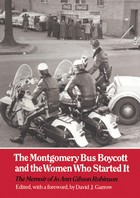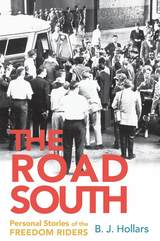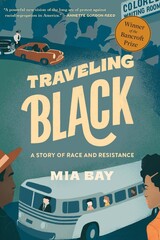
As head of the Women's Political Council, the most active and assertive black civic organization in the City, Jo Ann Robinson was centrally involved in planning for a boycott far in advance and was able to immediately initiate it the evening Rosa Parks was arrested. Robinson also took part in curcial but ultimately unsuccessful negotiations with white officials both before and during the protest. Her proud, moving narrative vividly portrays her colleagues in the struggle, their strategies and decisions, and evokes the complex emotional currents in Montgomery during the boycott.
The Montgomery Bus Boycott ignited the civil rights movement and has always been vitally important in southern history and African American history. This seminal publication, named to Wall Street Journal's top ten list of book on the civil rights movement, has long been a milestone publication in understanding America's complicated racial history.

In May 1961, despite multiple Supreme Court rulings, segregation remained alive and well within the system of interstate travel. All across the American South, interstate buses as well as their travel facilities were divided racially. This blatant disregard for law and morality spurred the Congress of Racial Equality to send thirteen individuals—seven black, six white—on a harrowing bus trip throughout the South as a sign of protest.
These original riders were met with disapproval, arrests and violence along the way, but that did not stop the movement. That summer, more than four hundred Freedom Riders continued their journey—many of them concluding their ride at Mississippi’s notorious Parchman Farm, where they endured further abuses and indignities. As a result of the riders sacrifice, by November of 1961, the Interstate Commerce Commission finally put an end to interstate commerce segregation, and in the process, elevated the riders to become a source of inspiration for other civil rights campaigns such as voter registration rights and school desegregation.
While much has been written on the Freedom Rides, far less has been published about the individual riders. Join award-winning author B. J. Hollars as he sets out on his own journey to meet them, retracing the historic route and learning the stories of as many surviving riders as he could. The Road South: Personal Stories of the Freedom Riders offers an intimate look into the lives and legacies of the riders. Throughout the book these civil rights veterans’ poignant, personal stories offer timely insights into America’s racial past and hopeful future.
Weaving the past with the present, Hollars aims to demystify the legendary journey, while also confronting more modern concerns related to race in America. The Road South is part memoir and part research-based journalism. It transcends the traditional textbook version of this historical journey to highlight the fascinating stories of the many riders—both black and white—who risked their lives to move the country forward.

Winner of the Bancroft Prize
Winner of the David J. Langum Prize
Winner of the Lillian Smith Book Award
Winner of the Order of the Coif Book Award
Winner of the OAH Liberty Legacy Foundation Award
A New York Times Critics’ Top Book of the Year
“This extraordinary book is a powerful addition to the history of travel segregation…Mia Bay shows that Black mobility has always been a struggle.”
—Ibram X. Kendi, author of How to Be an Antiracist
“In Mia Bay’s superb history of mobility and resistance, the question of literal movement becomes a way to understand the civil rights movement writ large.”
—Jennifer Szalai, New York Times
“Traveling Black is well worth the fare. Indeed, it is certain to become the new standard on this important, and too often forgotten, history.”
—Henry Louis Gates, Jr., author of Stony the Road
From Plessy v. Ferguson to #DrivingWhileBlack, African Americans have fought to move freely around the United States. But why this focus on Black mobility? From stagecoaches and trains to buses, cars, and planes, Traveling Black explores when, how, and why racial restrictions took shape in America and brilliantly portrays what it was like to live with them.
Mia Bay rescues forgotten stories of passengers who made it home despite being insulted, stranded, re-routed, or ignored. She shows that Black travelers never stopped challenging these humiliations, documenting a sustained fight for redress that falls outside the traditional boundaries of the civil rights movement. A riveting, character-rich account of the rise and fall of racial segregation, it reveals just how central travel restrictions were to the creation of Jim Crow laws—and why free movement has been at the heart of the quest for racial justice ever since.
READERS
Browse our collection.
PUBLISHERS
See BiblioVault's publisher services.
STUDENT SERVICES
Files for college accessibility offices.
UChicago Accessibility Resources
home | accessibility | search | about | contact us
BiblioVault ® 2001 - 2024
The University of Chicago Press









